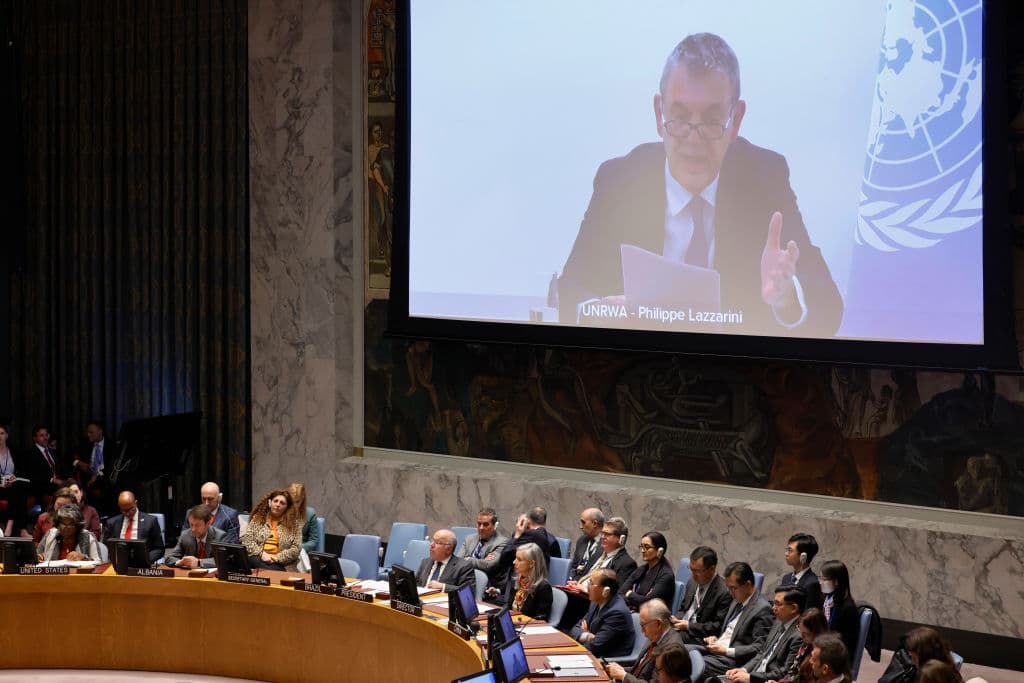Is It Logical for America To Be Considered Its Own Aid Operation To Replace the UN’s Discredited Relief and Works Agency?
In the wake of the slaughter of October 7, in which a number of Unrwa staffers were complicit — and have since been fired — big questions linger.

When it comes to reputation management, Unrwa, the UN’s discredited Palestinian Arab relief agency, may well be beyond repair. After all, that 10 percent of one’s employees are affiliated with a terrorist group, as Israel asserts is the case of Unrwa, fails to instill much confidence. Yet at least one prominent alternative that Israel has been exploring — America’s Agency for International Development — comes with a few caveats of its own.
The Lebanese newspaper al-Akhbar reports that Hamas would demand that Unrwa be allowed to continue to operate as part of any cease-fire framework. That’s unlikely to make sense to Israel. The cat is out of the bag in respect of Unrwa’s bloated ranks. Israel’s foreign minister, Israel Katz, refuses even to meet with Unrwa’s chief, Philippe Lazzarini. He was in charge of the agency while at least 12 of his staffers participated in the October 7 terrorist attacks.
The problem is that even were Unrwa to disappear, what comes next? Ynet reports that the World Food Program, which is under the umbrella of the UN, is one option that could replace Unrwa in a post-war Gaza Strip. Another alternative Israel is said to be considering is Usaid. According to Ynet, Israel is eyeing expanding that foreign assistance agency’s reach in the region, “subject to U.S. approval.”
On the whole, Usaid has a better track record than the badly compromised Unrwa. That doesn’t mean it is without some potential staffing issues of its own. Given the harsh reality of extremist infiltration of so-called relief efforts in Gaza, officials at both Jerusalem and Washington can take little for granted anymore.
A charity innocuously called Tomorrow’s Youth Organization is using millions of dollars from a fund named for a former New York congresswoman, Nita Lowey, to underwrite Palestinian refugee causes in the Middle East even as that organization’s executive director does double duty as a rapper who glorifies illicit drug use and hatred of Israel.
In December 2020, Congress passed the Nita M. Lowey Middle East Partnership for Peace Act. As America’s major civilian foreign aid agency, Usaid is tasked with doling out the $250 million fund, in coordination with the Department of State, for the cultural “dialogue” efforts its administrator, Samantha Power, deems worthy. Prominent among them is Tomorrow’s Youth Organization, whose executive director, Raffoul Saadeh writes and performs rap songs under the name LXIV 64.
One such ditty is “Scars of Gaza,” which contains the lyrics, “Auschwitz reincarnated brought back to life by the victims who were burned by the Nazis.” According to Mr. Sadeh’s Facebook page, a video for the song, which ends with a call for violence, was posted to YouTube in May 2021, but has subsequently been removed. Federal records seen by the Sun show that in 2022, Usaid committed nearly $3.3 million to Tomorrow’s Youth Organization, which says its flagship office is at “Nablus, Palestine.”
This is despite the fact that Mr. Saadeh’s lyrics are bristling with spurious and defamatory references to Israel — another video, according to Palestinian Media Watch, is “one continuous demonization with lies and libels against Israel with yet another Holocaust comparison.” The video for the song “From the Ghetto,” which also demonizes Israel, was seemingly scrubbed from YouTube following a PMW report mentioning it last March.
Mr. Saadeh “writes and sings rap songs about Palestinian issues in which he compares Israel to Nazis and his life in Jerusalem to being caged in a ghetto,” PMW states, adding that “he also writes love songs, including Snow White, in which he presents the use of illegal drugs and gun violence as normal behavior.”
How all this squares with Tomorrow’s Youth’s stated aims of “implementing specific mental health, psychosocial and educational interventions and programming” for Palestinian Arab youth or “building the foundation for peaceful coexistence between Israelis and Palestinians” is not addressed in the Usaid-funded group’s literature.
Is there any oversight mechanism in place to monitor how the group under Mr. Saadeh’s stewardship and other groups spend the millions of American taxpayer dollars? Apparently, no. In response to a query from the Sun, a representative of Usaid would say only that it takes precautions.
“We take,” the spokesman said, “every precaution to safeguard all U.S. taxpayer supported assistance for its intended purpose and to support Palestinian civilians directly. Usaid’s work with Tomorrow’s Youth Organization is specifically to support over two hundred women entrepreneurs and dozens of women-led small businesses, while fostering coexistence and reconciliation within and across communities.”
Usaid, according to its own website, emphasizes “diversity, equity, and inclusion.” With an annual budget of $27 billion, money is less of an issue for the hydra-headed agency than how and where it is being spent. As the calamity of Unrwa demonstrates, the time for asking tough questions of top administrators and insisting on vigorous vetting of the rank and file is not later, but right now.

